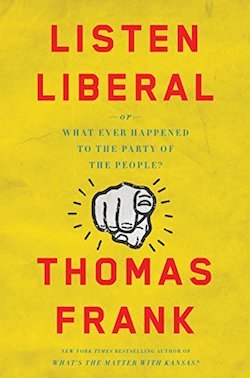The populist who crashed the party
“I apologize for standing up so high,” Thomas Frank announced from behind the podium at Town Hall Seattle last night. He observed that the audience members who gathered by the stage to ask him questions were forced to gaze up at him, as though he was a wizened old man sitting at the peak of a mountain. “It's not very populist of me,” he joked.

In reality, Frank couldn’t be any more populist if he discussed his new-in-paperback book Listen, Liberal while sitting in the middle of the audience in the pews of Town Hall. Frank addressed income inequality and the Democratic Party establishment’s dismissal of the working class with a single-minded intensity.
Frank railed on the current system, in which a few elites in the top ten percent enjoy a booming economy while everyone else in America lives in a state of perpetual recession. He says that since roughly the 1980s, America has offered its citizens economic “growth that doesn't grow and prosperity that doesn't prosper.”
Frank places the majority of the blame on the professional class of experts who run the Democratic Party. He said they refuse to crack down on their peers in the banking, pharmaceutical, and real estate businesses who are looting the American people for all they’re worth. This is because, he said, Democrats have come to believe in a “meritocracy” where “everyone gets what they deserve and what they deserve is directly tied to how they did in school.” If you didn’t go to a good school, or if you chose the wrong (read: non-STEM) major, Frank said, the creative class — and there Frank paused to reflect on the absurdity of “the idea that creativity is the property of a class” — believes you deserve the misfortune that you somehow delivered onto yourself.
Meanwhile, the pundits on every channel declare that “the answer to every question every time is to move to the center,” when in fact the problem is clear: “the party of the left isn't interested in its historical mission,” Frank said. That mission? To stand up for the working class. Donald Trump proved himself during the 2016 election to be “a hypocrite, a vulgarian, and a bigot,” Frank said, but he admitted that Trump recognized the unrest unfolding in middle America. The sorrows that Trump highlighted during the campaign, Frank said with a tone of astonishment in his voice — “those are things my people used to say.”
And because Trump continually discussed a problem that Democrats refused to even acknowledge, the Democratic Party is now at its lowest ebb “since 1920.” Frank told the audience that the only way to interpret the 2016 results is “a wipeout for the Democratic Party,” which he accused of “militant complacency.”
By design, Frank didn’t focus much on solutions to the problem. He was in full-on accusatory mode, identifying the systemic rot in America’s economy and the Democratic Party, though toward the end of his lecture he rattled off a few policies Democrats should support, including free or affordable secondary education and laws that promote unionization. The solutions aren’t the hard part, Frank said. On the contrary, “it takes ten seconds to come up with winning issues.” The problem, he warned, is that the Democratic Party is “going to have to be dragged kicking and screaming to victory.”